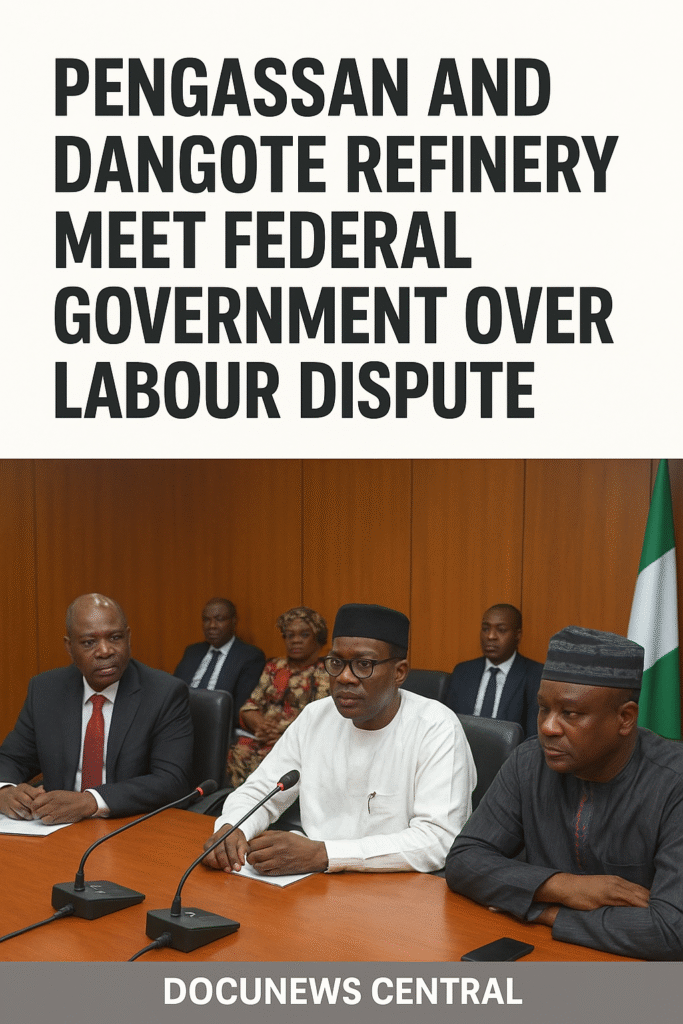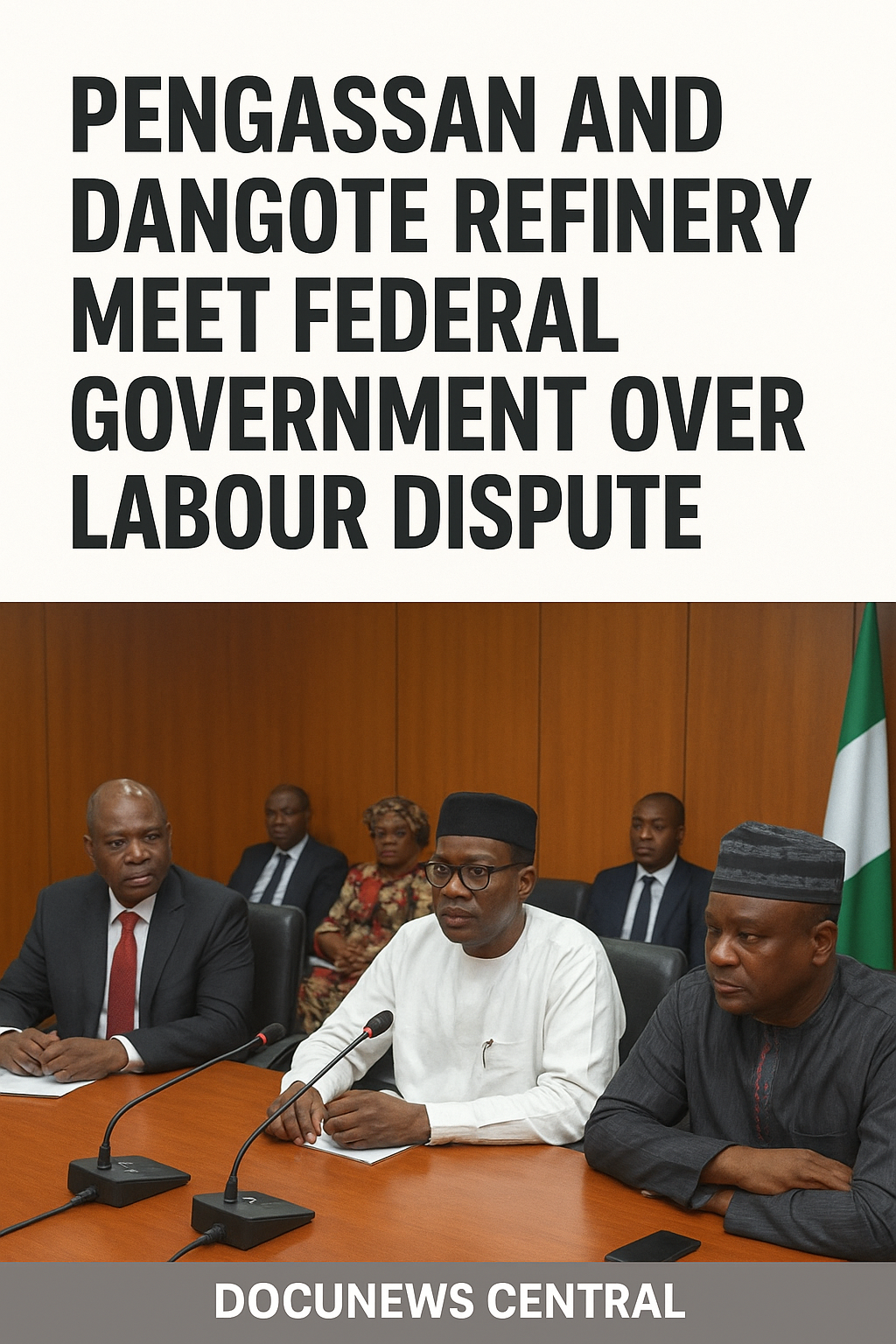
PENGASSAN and Dangote Refinery Meet Federal Government Over Labour Dispute
Emergency Meeting in Abuja
An urgent meeting is taking place in Abuja between the Petroleum and Natural Gas Senior Staff Association of Nigeria (PENGASSAN) and the management of the Dangote Petroleum Refinery.
The Federal Government called the meeting to stop a growing labour dispute that has unsettled Nigeria’s oil and gas sector.
The session is being held at the Ministry of Labour and Employment.
Top government officials, senior union leaders and executives of the refinery are all present.
The goal is simple: end the crisis before it cripples the country’s oil supply chain. read also ARISE news anchor Somtochukwu killed in Abuja robbery docunewscentral.com
Why the Dispute Started
Tension started when reports surfaced that the Dangote Refinery sacked hundreds of workers.
Union sources claim that about 800 employees lost their jobs without proper consultation.
PENGASSAN insists that the mass dismissal violates existing labour agreements.
The union says it tried to discuss the matter with the refinery management.
But talks broke down, and union leaders called for stronger action.
Last week, PENGASSAN directed its members to halt the supply of natural gas to the Dangote facility.
This move quickly caught the attention of the Federal Government.
Dangote Refinery’s Response
The management of the refinery has disputed the union’s claims.
Officials argue that the downsizing was a necessary business decision.
They also stress that the process followed due process and labour law.
A senior manager told reporters that “the refinery remains committed to fair labour practices.”
He added that only a small number of workers were affected and that severance packages were offered.
Despite this statement, PENGASSAN maintains that the dismissals were too abrupt and unfair.
Government Steps In
The strike threat and the stoppage of gas supply raised alarms in government circles.
The Dangote Petroleum Refinery is a key national project, built to reduce Nigeria’s dependence on imported fuel.
Any prolonged shutdown could disrupt local fuel supply and create fresh economic pressure.
The Ministry of Labour and Employment quickly invited both sides for an emergency reconciliation.
Officials say they will not leave the room until a temporary settlement is reached.
They hope to broker a deal that restores gas supply and sets up a path for formal negotiations.
High Stakes for the Economy
The stakes are high.
Nigeria already struggles with frequent fuel shortages and unstable petrol prices.
The Dangote Refinery, a multi-billion-dollar investment, is seen as the country’s best chance to secure local production of refined products.
Energy analysts warn that a prolonged dispute could trigger wider disruptions.
“If gas supply remains cut off, production will slow,” said Lagos-based analyst Chika Nwosu.
“That means more pressure on fuel prices and on the naira.”
Voices from PENGASSAN
Union leaders remain firm.
They insist the dismissed workers must be reinstated or at least properly compensated.
“Workers cannot be treated as disposable,” said a senior PENGASSAN official after arriving at the meeting.
“We want dialogue, but our members’ rights must be respected.”
The union says it will continue to mobilise until a fair deal is reached.
It also warns that if talks fail, a nationwide action is possible. legit.ng
Dangote Team’s Stand
The refinery’s executives say they want a peaceful resolution.
They point to the company’s record of creating thousands of jobs and investing billions in Nigeria.
A spokesperson said the refinery cannot operate smoothly without good relations with its workforce.
“We want this matter settled quickly. We value our staff,” the spokesperson said.
Reactions from the Public
News of the dispute has spread quickly across social media.
Many Nigerians express concern that the fight could lead to higher fuel prices.
Others blame both sides for letting the matter escalate.
In Lagos, taxi driver Adekunle Adebayo said, “We are tired of strikes. If this refinery stops, fuel will cost more. Government must make them agree today.”
On Twitter (X), users debate whether the refinery acted too harshly.
Some support the union’s demand for fairness.
Others argue that companies have the right to restructure.
Experts Give Their Analysis
Labour expert Dr. Nkiru Okeke believes the situation reflects a wider challenge in Nigeria’s industrial relations.
“Mass layoffs without transparent dialogue are a recurring issue,” she said.
“Companies need to follow due process, and unions must be ready to compromise. The government’s role is to create a neutral platform for resolution.”
Energy economist Ibrahim Musa adds that the refinery’s importance makes the dispute critical.
“This is not just another factory. The Dangote Refinery is central to Nigeria’s energy security,” he said.
“Any prolonged shutdown will hurt the economy, affect the naira and push up inflation.”
Political Implications
The Federal Government cannot afford a prolonged standoff.
President Bola Tinubu’s administration is already under pressure over rising living costs and fuel subsidy reforms.
A major disruption in refinery operations could spark fresh public anger.
Analysts say the government must strike a delicate balance—protect workers’ rights while safeguarding a project seen as a national asset.
Steps Toward Resolution
Inside the Abuja meeting room, negotiators are working behind closed doors.
Officials from the Ministry of Labour have asked both sides to table their demands and possible compromises.
Sources say the government may propose an independent panel to review the layoffs.
The panel could recommend either reinstatement or improved severance packages.
PENGASSAN leaders say they are open to discussion but want written guarantees.
A Test for Nigeria’s Industrial Relations
This standoff is a major test of how Nigeria manages labour disputes in key industries.
Observers say that if the government can secure a quick, fair settlement, it will strengthen confidence in Nigeria’s investment climate.
But if talks collapse, the country could face fuel supply shocks and a damaging loss of investor trust.
Next Steps to Watch
The Abuja talks are expected to continue late into the night.
If a deal is reached, both parties may sign a communique and announce a temporary truce.
If no deal emerges, PENGASSAN could escalate its action, possibly calling for a nationwide strike.
The Ministry of Labour has urged all sides to remain calm.
Officials stress that dialogue is the only path forward.
Conclusion
The industrial dispute between PENGASSAN and the Dangote Petroleum Refinery has become a national concern.
It threatens fuel supply, economic stability and investor confidence.
The Federal Government’s intervention shows how high the stakes are.
All eyes are now on Abuja.
Nigerians wait to see if today’s meeting will produce a breakthrough or set the stage for a wider crisis.
DocuNews Central will continue to follow the story and provide updates as events unfold.











